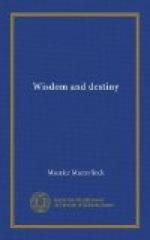47. And yet virtue often is chastised, and the advent of misfortune hastened, by the soul’s very strength; for the greater our love may be, the greater the surface becomes we expose to majestic sorrow; wherefore none the less does the sage never cease his endeavours to enlarge this beautiful surface. Yes, it must be admitted, destiny is not always content to crouch in the darkness; her ice-cold hands will at times go prowling in the light, and seize on more beautiful victims. The tragic name of Antigone has already escaped me; and there will, doubtless, be many will say, “She surely fell victim to destiny, all her great force notwithstanding; and is she not the instance we long have been seeking in vain?” It cannot be gainsaid: Antigone fell into the hands of the ruthless goddess, for the reason that there lay in her soul three times the strength of any ordinary woman. She died; for fate had contrived it so that she had to choose between death and what seemed to her a sister’s imperative duty. She suddenly found herself wedged between death and love—love of the purest and most disinterested kind, its object being a shade she would never behold on earth. And if destiny thus has enabled to lure her into the murderous angle that duty and death had formed, it was only because her soul, that was loftier far than the soul of the others, saw, stretching before it, the insurmountable barrier of duty—that her poor sister Ismene could not see, even when it was shown her. And, at that moment, as they both stood there on the threshold of the palace, the same voices spoke to them; Antigone listening only to the voice from above, wherefore she died; Ismene unconscious of any save that which came from below—and she lived. But instil into Antigone’s soul something of the weakness that paralysed Ophelia and Margaret, would destiny




